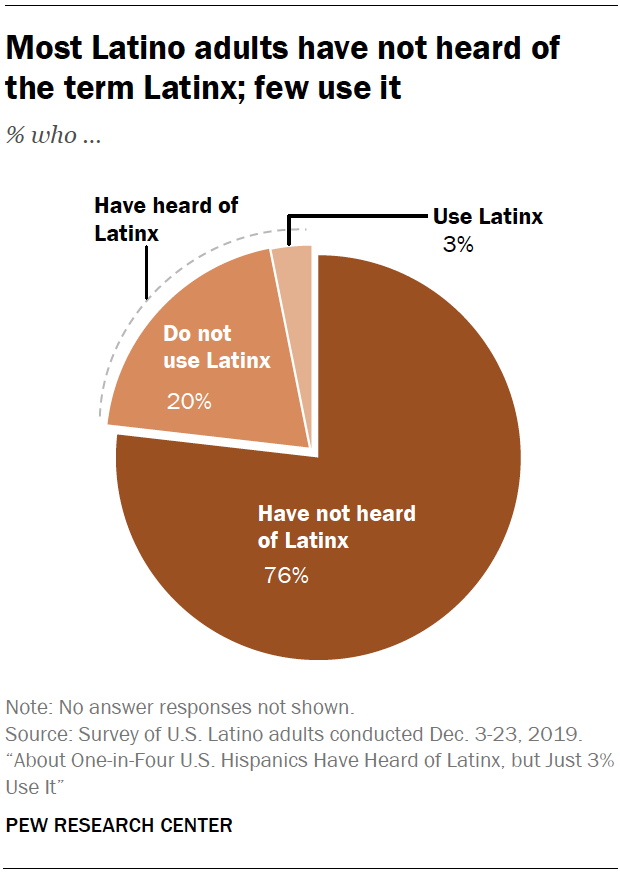About One-in-Four U.S. Hispanics Have Heard of Latinx, but Just 3% Use It
Pan-ethnic labels describing the U.S. population of people tracing their roots to Latin America and Spain have been introduced over the decades, rising and falling in popularity. Today, the two dominant labels in use are Hispanic and Latino, with origins in the 1970s and 1990s respectively.

A chart showing most Latino adults have not heard of the term Latinx; few use it
More recently, a new, gender-neutral, pan-ethnic label, Latinx, has emerged as an alternative that is used by some news and entertainment outlets, corporations, local governments and universities to describe the nation’s Hispanic population.
However, for the population it is meant to describe, only 23% of U.S. adults who self-identify as Hispanic or Latino have heard of the term Latinx, and just 3% say they use it to describe themselves, according to a nationally representative, bilingual survey of U.S. Hispanic adults conducted in December 2019 by Pew Research Center.
The emergence of Latinx coincides with a global movement to introduce gender-neutral nouns and pronouns into many languages whose grammar has traditionally used male or female constructions. In the United States, the first uses of Latinx appeared more than a decade ago. It was added to a widely used English dictionary in 2018, reflecting its greater use.
more...
Adding (from the piece): "Some described the term as an “anglicism” of the Spanish language,..." and "In Latin America, there are also examples of the use of “e” as a gender-neutral replacement in Spanish for “a” and “o” in the ending of words that refer to groups of people – for example, using the gender-neutral “todes” in place of the gendered “todos” and “todas.” "
So, maybe, "Latine" would be more authentic.
Bernardo de La Paz
(49,043 posts)brush
(53,871 posts)zipplewrath
(16,646 posts)Would one pronounce it:
laTEEN
brush
(53,871 posts)Both terms are gender neutral and easier than having to say or write Latinos/Latinas. Maybe one will catch on.
https://www.google.com/search?client=firefox-b-1-d&q=how+to+pronounce+latine
bluedye33139
(1,474 posts)My partner is from Panama, and a few weeks ago I asked him how he feels about latinx. He said he doesn't understand why people are using it, and we talked about gender and representation and dichotomous binaries and he pointed out that the x really isn't a termination in Spanish and therefore doesn't make sense to him.
He also said that he thinks the word Latin is good enough, as it already exists and everyone understands it.
I get why the term came about, and I can see that in some discourse communities it would be appropriate, but I'm not sold on it as the only term to describe Hispanic people.
On the other hand, it's not problematic.
Response to bluedye33139 (Reply #3)
Post removed
Response to Post removed (Reply #9)
bluedye33139 This message was self-deleted by its author.
Response to bluedye33139 (Reply #10)
Backseat Driver This message was self-deleted by its author.
Response to Backseat Driver (Reply #12)
bluedye33139 This message was self-deleted by its author.
Response to Post removed (Reply #9)
bluedye33139 This message was self-deleted by its author.
hlthe2b
(102,376 posts)(i.e., Latinx) and since my work has always kept me up-to-date on changes to terminology and appropriate classifications based on race, ethnicity, and gender-related issues, I was quite interested to know where this term stands in acceptance and adoption.
Living in Colorado, where Hispanic populations are numerous, populous, and generally well-integrated, I began my own unofficial questioning in the course of my work and have yet to identify a single individual who uses it. Not hardly scientific, granted. So, I inquired of a couple of friends of friends who work at Spanish language radio stations and a reporter friend at the Denver Post who covers Spanish-speaking communities as well. They'd heard of it certainly but said it was a non-issue at this point in time and one indicated that they too were surprised when they heard the same Vaseline-sponsored PSA that I had.
So, I guess we shall see, but not a term I will change to at this point. I will be interested in the opinions of others, of course.
TlalocW
(15,391 posts)I'm Caucasian but with a degree in Spanish, and I belong to some cultural Facebook groups. One of them - Mitu - pushes it in their posts and then about half the comments are people making fun of them. Language wise, I always thought it was generally accepted that nouns ending with o were masculine, a or as (plural) were feminine, and os depended on the context, and I honestly don't see it being adopted, but I could be wrong.
So if you heard someone refer to their hermanos, that could mean brothers or siblings depending on the context.
And all this is generally speaking - there are exceptions like día and words ending with ema like sistema, etc. that are masculine.
TlalocW
Sneederbunk
(14,303 posts)lagomorph777
(30,613 posts)eppur_se_muova
(36,290 posts)4dog
(505 posts)how would you pronounce it/them?